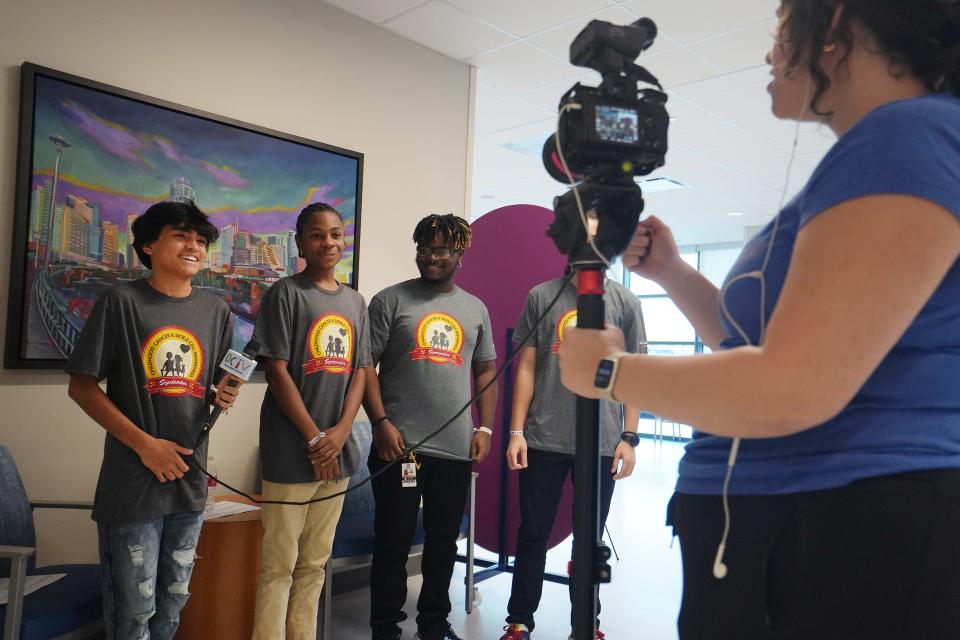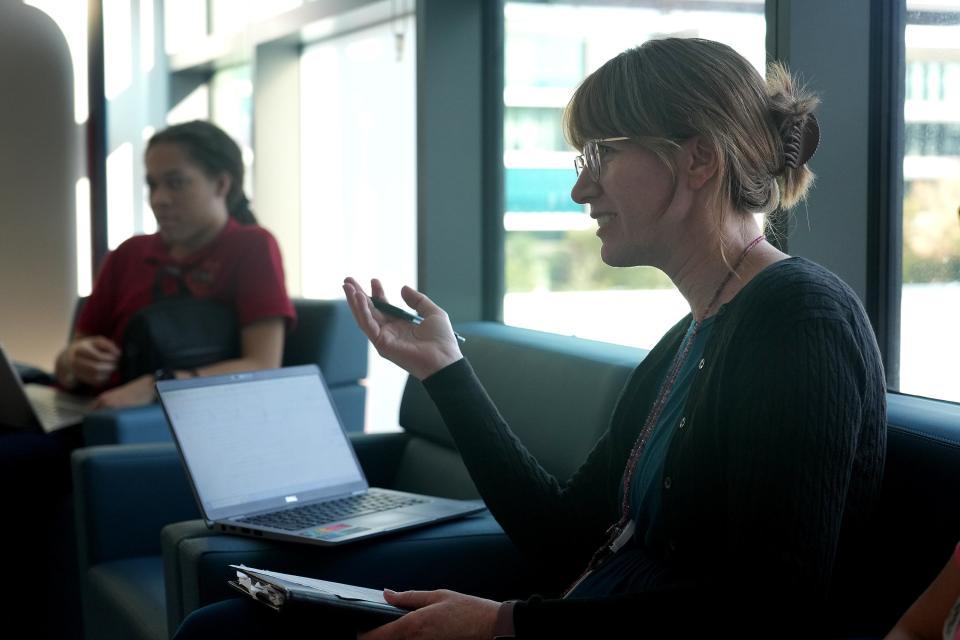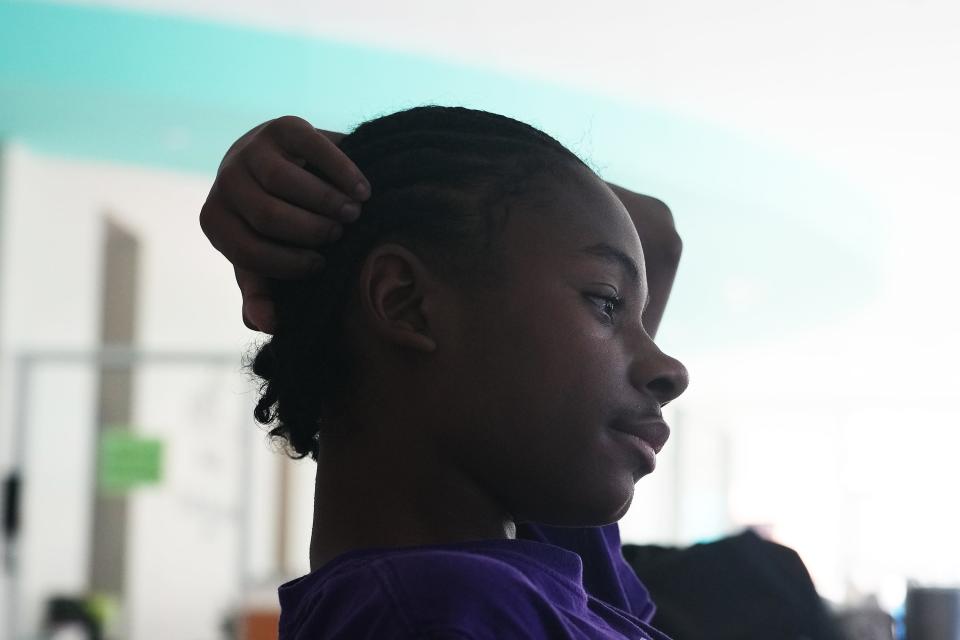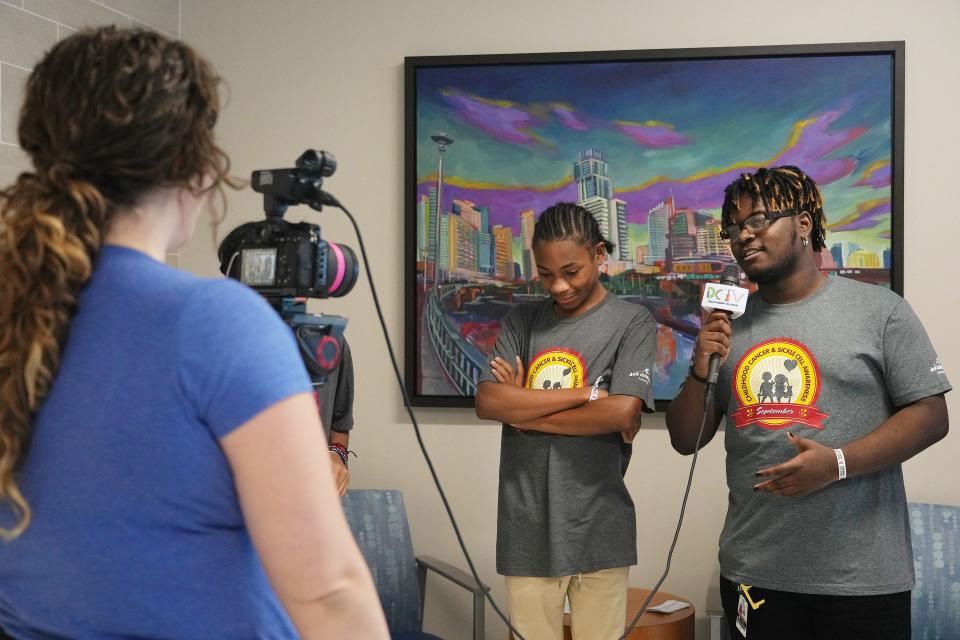The Sickle Cell Squad, a group of teens, help kids understand the disease at Dell Children's
The Sickle Cell Squad is on the move. With microphone in hand, they are roaming Dell Children's Medical Center's central location asking staff members various wacky questions.
What's your favorite state? Alabama, said security guard Chesea Wilson. She loves the University of Alabama's football team.
If you had a time machine, when and where would you go? I would go see family, said Victoria De La Garza, day shift supervisor of the neonatal intensive care unit.
How many doors does the gift shop have? Three, guesses respiratory therapist Maria Serrano. Turns out she's right.
During their first meeting of the school year, the members of the Sickle Cell Squad are recording a segment for the in-hospital TV channel, DCTV, to entertain kids who are in the hospital and let them know a little bit about sickle cell disease.
The Sickle Cell Squad, a group of teenagers with sickle cell disease, gather once a month at the Children's Blood and Cancer Center next to the hospital. They do advocacy work, help younger kids understand their sickle cell disease and provide an outlet to talk with other teens with sickle cell disease.

Expanding care: 'Why we came here': Austin's Dell Children's developing center to treat sickle cell disease
Building the squad
Dell Children's has been developing a comprehensive sickle cell center, which will give patients more access to clinical trials and the newest treatments, including four FDA-approved medications and stem cell transplants. New gene therapies are also on the horizon.
For the kids affected now, Dell Children's started the Sickle Cell Squad in February 2022.
The squad has been part of back-to-school fairs to educate people. They've created comfort bags with coloring books, snacks, heading pads and play putty for kids hospitalized with sickle cell disease. They've also educated their doctors and nurses about how they experience their disease.

"It has evolved into what they wanted it to be," said Sandy George, the coordinator of the group and school liaison for the Blood and Cancer Center. It has become a leadership group, she said. It's not a support group, although the kids do learn from one another.
"You can be open about how you feel," 16-year-old Chris Gibson said of the group. "You can help other people understand what's going on."
For Christian Austin, 18, the group has helped him get a different perspective. "All of us basically have the same thing," he said. "Seeing it from their perspectives can help our own situation."
"It makes it easier," said 17-year-old Donalvon Ross.
The program is funded through grants from Superhero Kids, which funds activities at the Children's Blood and Cancer Center. Participants receive gift certificates if they come regularly because they put in time to do advocacy and education for other children, families and the public.

What is sickle cell disease?
Sickle cell disease is a genetic disorder that causes red blood cells to be shaped like sickles. These sickle-shaped cells then block the blood flow and can affect organs, including kidneys, liver and spleen. People with sickle cell disease can have low oxygen levels in their blood.
Without good oxygenated blood, sickle cell disease can sometimes affect brain function or cause necrosis in the bones.
It mainly affects people who are African American or Hispanic.
Since 1983, babies born in Texas since 1983 have been checked for sickle cell as part of the newborn screening program, which parents know as a heel prick blood test usually taken in the first day or two after birth and then again one to two weeks later. In Texas, 180 to 200 babies are diagnosed yearly with sickle cell disease, according to the newborn screening program.
Newborn screening: Most babies with this rare genetic disease are on ventilators by 8 months. This Austin baby beat the odds
Sickle cell disease can be very painful, the teens say. "It's soreness and throbbing," Gibson said. "It feels like you're being hit by a truck. Every part of your body starts to hurt. I can't move. I can't stand up."

There are things that the squad knows can trigger a pain crisis.
Austin knows if he's very active one day, the muscles that he overused will hurt. Each person experiences it differently, he said.
Some people are able to do swimming and snowboarding, he said. Other people are affected by extreme changes in temperature.
"What the weather looks like, it could cause a pain," Ross said. He keeps an eye on temperature changes.
Dehydration also can lead to pain.
Finding distractions in the hospital
Sometimes, children with sickle cell disease can manage a pain crisis at home; sometimes, they have to be hospitalized for treatment, including cleaning out their blood. That hospitalization can last weeks or even months.
When they are hospitalized, it can be very boring, which is why, on this day, the squad is recording a video to entertain kids by asking wacky questions to hospital staff. They've all benefited from having art therapy, music therapy, video games and other activities at the hospital. This month the Kendra Scott Creative Center is opening up at the hospital to give hospitalized kids more to do.
With the video recorded and pizza inhaled, the squad is planning for its October gathering. They are going to make breakfast for the doctors and nurses in the clinic. That leads to a discussion of all the different kinds of breakfast foods they think they can make on an electric skillet. Pancakes or French toast: Which one is better? Ross is on team French toast. Gibson is definitely on team pancake.
It's a heated discussion, one that has nothing to do with their disease, and that's OK, too.
This article originally appeared on Austin American-Statesman: Dell Children's Sickle Cell Squad helps kids understand the disease

